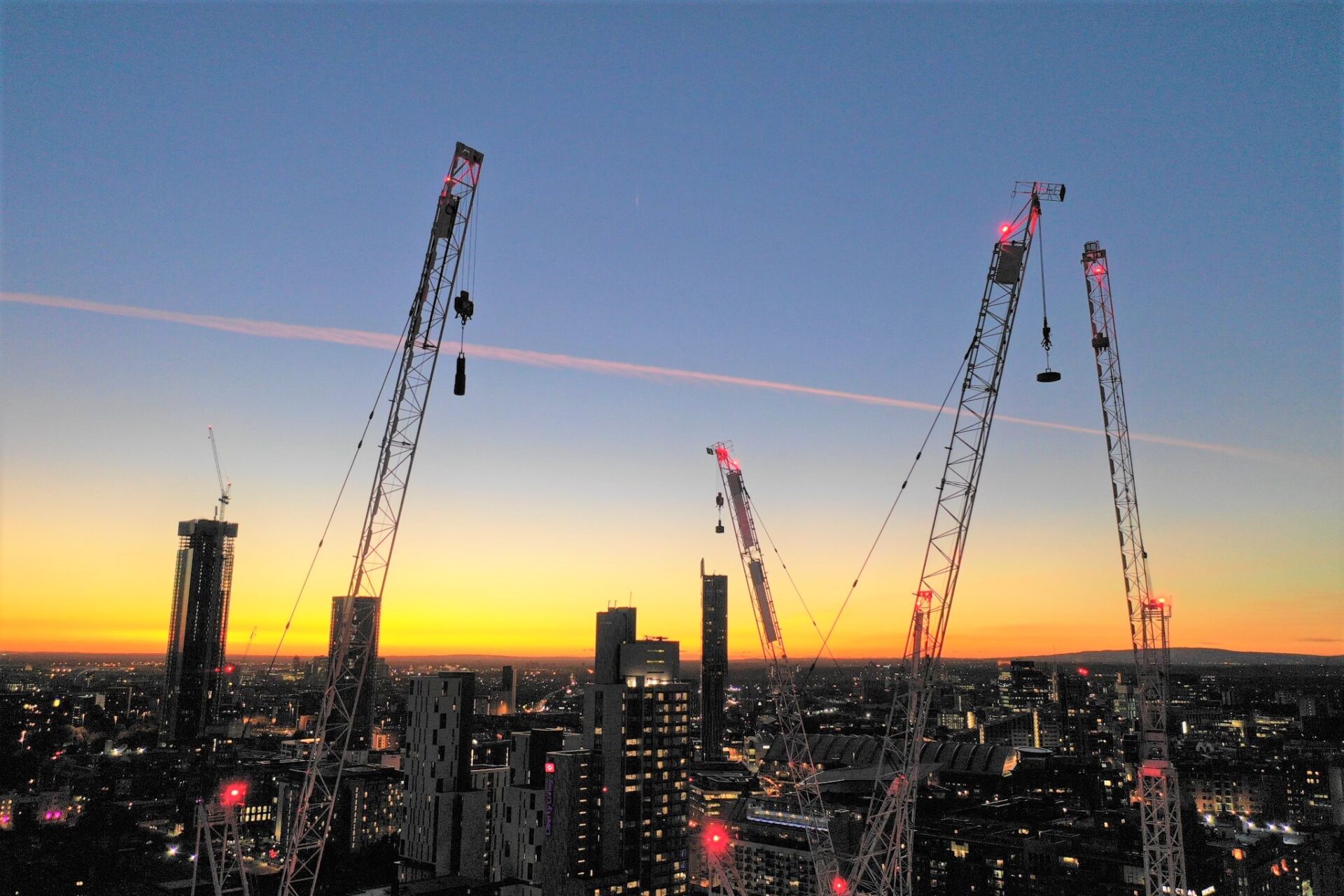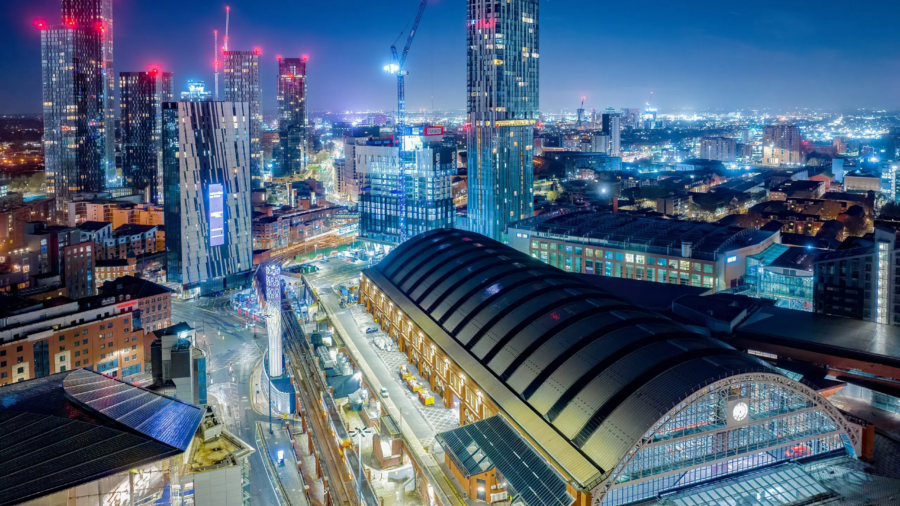Manchester is one of the most vibrant and dynamic cities in the UK, and its construction industry reflects that. The city has a rich history of innovation and creativity, and its construction sector is constantly evolving and adapting to the changing needs and demands of its residents, businesses, and visitors.
In this article, we will give you a guide to Manchester’s construction industry, covering its current projects, major players, and trends. Whether you are a contractor, a supplier, an investor, or a tourist, you will find something interesting and useful in this article.
The facts
According to Urban Connect, the construction sector makes up 6.8% of Greater Manchester’s economy, worth upwards of £3 billion and employing roughly 50,000 people. As the economy swells – 2015-16 saw a 5% growth – demand for construction and technical engineering expertise will only increase. The forecasted population growth over the next 20 years means there should be no skills shortage. The combined student population of Greater Manchester’s four universities is 100,000, with 14,000 studying engineering or other STEM courses. This gives access to an ever-changing, qualified talent pool.
Current projects
Manchester’s construction industry is booming, with a multitude of projects underway and planned for the future. The city is transforming its skyline, its infrastructure, its culture, and its economy with these projects. Here are some of the most notable ones:
- Trinity Islands: This is a five-tower complex that will consist of nearly 1,400 homes, a school, offices, shops, and leisure facilities. It will be the tallest residential development in the UK, reaching up to 213 metres. It is being developed by Renaker, one of the leading construction companies in Manchester.
- Mayfield: This is a £1.4 billion regeneration scheme that will create a new neighbourhood on a 24-acre site near Piccadilly station. It will include around 1,500 homes, a 6.5-acre park, a 650,000 sq ft office building, a 581-bed hotel, and a variety of cultural and leisure venues. It is being designed by Bennetts Associates, an award-winning architectural firm.
- Airport City: This is a £1 billion project that will create a new business district at Manchester Airport, the third busiest airport in the UK. It will feature 5 million sq ft of office, hotel, retail, and logistics space, as well as a transport interchange and a public realm. It is being delivered by a joint venture of Manchester Airports Group, Beijing Construction Engineering Group, Carillion, and Greater Manchester Pension Fund.
- Manchester Museum: This is a £12.7 million project that will expand and enhance the Manchester Museum, the largest university museum in the UK. It will include a new South Asia Gallery, a new China Gallery, a new entrance hall, a new temporary exhibition space, and improved accessibility and facilities. It is being funded by the Heritage Lottery Fund, the University of Manchester, and private donors.
- North Hub: This is a £1 billion project that will improve the rail network in the North of England, connecting Manchester with Leeds, Liverpool, Newcastle, and Sheffield. It will include the transformation of Manchester Victoria station, the electrification of key routes, the upgrade of signalling and track, and the introduction of new trains and services. It is being led by Network Rail, the owner and operator of the railway infrastructure.
These are just some of the many projects that are shaping Manchester’s construction industry and making it one of the most exciting and diverse sectors in the UK.

Major players
Manchester’s construction industry is supported by a network of major players, including contractors, developers, architects, engineers, consultants, and suppliers. These players work together to deliver high-quality projects that meet the needs and expectations of their clients and stakeholders. Here are some of the most prominent ones:
- Renaker: This is one of the leading construction companies in Manchester, specialising in high-rise residential developments. It has delivered some of the most iconic projects in the city, such as Deansgate Square, One Regent, and Wilburn Basin. It is also developing Trinity Islands, the tallest residential complex in the UK.
- Bruntwood: This is one of the largest property developers in Manchester, owning and managing over 100 buildings across the city. It focuses on creating innovative and sustainable workspaces, such as Circle Square, Neo, and Manchester Science Park. It also supports the arts, culture, and education sectors in the city, partnering with organisations such as Manchester International Festival, Manchester Metropolitan University, and Manchester Art Gallery.
- Bennetts Associates: This is an award-winning architectural firm that has designed some of the most prestigious and influential projects in Manchester, such as the Royal Exchange Theatre, the Manchester Central Library, and the Factory. It is also designing Mayfield, the £1.4 billion regeneration scheme near Piccadilly station.
- Arup: This is a global engineering and consulting firm that has been involved in some of the most complex and challenging projects in Manchester, such as the Manchester Airport expansion, the Manchester Arena, and the Etihad Stadium. It also provides expertise in areas such as urban planning, transport, energy, and digital.
- Travis Perkins: This is one of the largest suppliers of building materials in the UK, serving both trade and retail customers. It has over 20 branches in Manchester, offering a wide range of products, such as timber, bricks, plumbing, roofing, and landscaping. It also provides services such as tool hire, delivery, and trade credit.
These are just some of the many players that contribute to Manchester’s construction industry and make it a thriving and competitive sector.
Trends
Manchester’s construction industry is constantly evolving and adapting to the changing needs and demands of its residents, businesses, and visitors. The city is at the forefront of innovation and creativity, and its construction sector reflects that. Here are some of the trends that are shaping Manchester’s construction industry:
- Sustainability: Manchester is committed to becoming a zero-carbon city by 2038, and its construction industry plays a key role in achieving that goal. The city is implementing various measures and initiatives to reduce its environmental impact, such as using renewable energy sources, improving energy efficiency, promoting green transport, and enhancing biodiversity. The construction sector is also adopting sustainable practices, such as using low-carbon materials, minimising waste, and incorporating green features into buildings.
- Technology: Manchester is a hub of research and innovation, and its construction industry benefits from that. The city is embracing new technologies and digital solutions to improve the design, delivery, and operation of its projects, such as BIM, VR, AR, AI, and IoT. The construction sector is also collaborating with technology-driven industries and startups, such as biotech, fintech, and medtech, to create new opportunities and synergies.
- Diversity: Manchester is a diverse and inclusive city, and its construction industry reflects that. The city is working to increase the representation and participation of women, ethnic minorities, young people, and disabled people in its construction sector, as well as to promote equality and respect among its workforce. The construction sector is also supporting the social and cultural diversity of the city, by creating spaces and facilities that cater to all tastes and interests.
These are just some of the trends that are influencing Manchester’s construction industry and making it a progressive and forward-thinking sector.
The opportunities
With such a dynamic and diverse construction industry, Manchester offers plenty of opportunities for contractors, suppliers, and investors. Whether you are looking for a new project, a new partner, or a new market, Manchester has something for you. The city’s strategic position in the North West of England provides excellent connectivity by road, rail, and air, making it easily accessible for domestic and international travellers. The local government actively supports businesses and projects, providing incentives, grants, and resources to foster growth and development. The city’s cultural and social scene, featuring museums, galleries, theatres, music venues, restaurants, and bars, adds to its appeal, catering to all tastes and interests.
The accommodation
If you are planning to visit Manchester for business or pleasure, you will need a comfortable and convenient place to stay. That’s where Kiri City Stays comes in. Kiri City Stays is a serviced apartment provider that offers spacious, stylish, and affordable accommodation in Manchester. Whether you need a studio, a one-bedroom, or a two-bedroom apartment, Kiri City Stays has you covered. All of their apartments are fully furnished and equipped with modern amenities, such as Wi-Fi, smart TV, kitchen, and laundry facilities. Kiri City Stays is located in the heart of the city, close to major attractions, transport links, and business hubs. You can book your stay online or by phone, and enjoy flexible rates and cancellation policies. Kiri City Stays is the perfect choice for contractors, business travellers, and tourists who want to experience the best of Manchester.
conclusion
Manchester’s construction industry is a thriving and exciting sector that offers many opportunities for those who want to be part of it. The city is undergoing a transformation that will enhance its economic, social, and cultural status. If you want to explore Manchester’s construction industry, or simply enjoy its charms, don’t hesitate to contact Kiri City Stays and book your serviced apartment today. You won’t regret it.
